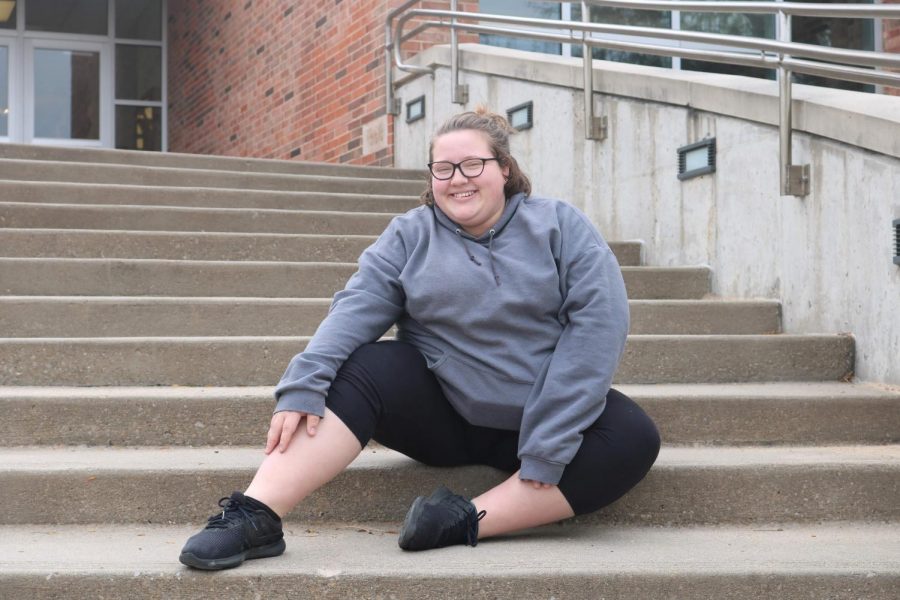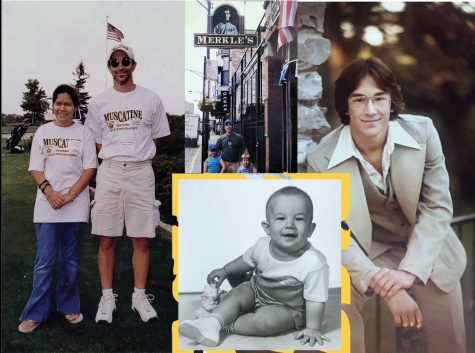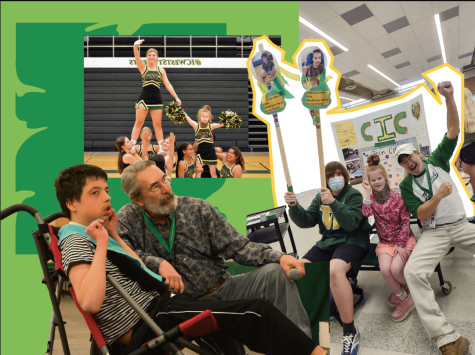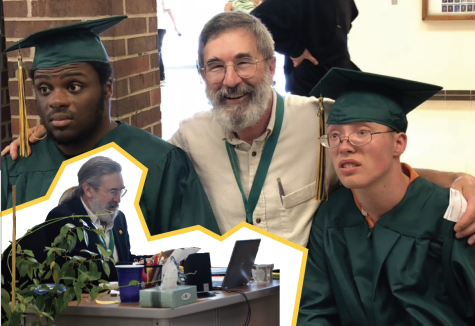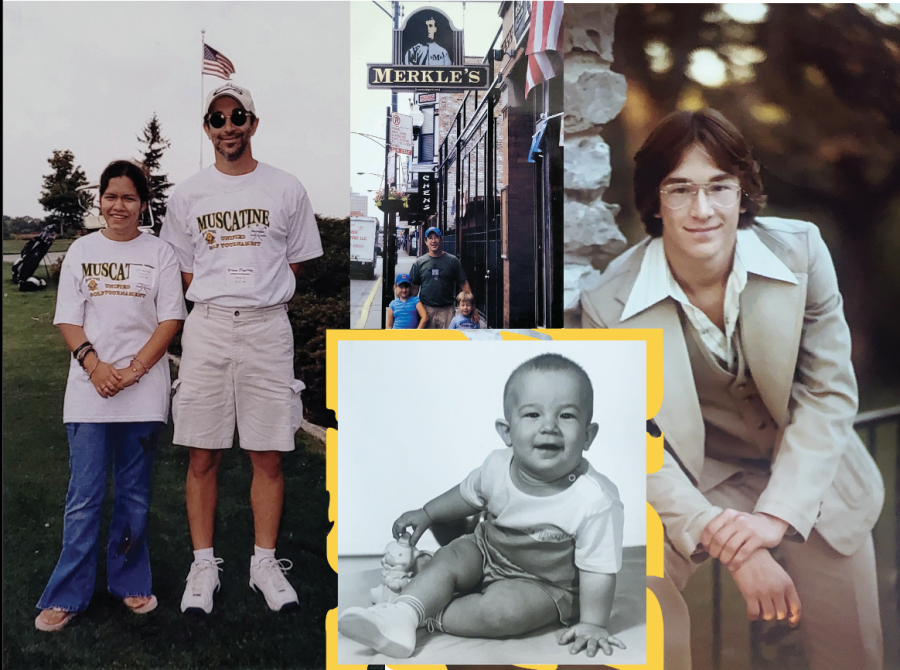Kora West ’20 sitting on the steps of West High right before telling us her story
Kora West ’20
Growing up bisexual, Kora West ’20 thought something was wrong with her.
“I didn’t know exactly what the label was, because I grew up in a smaller town, so we never talked about, like the LGBT community or anything,” said West.
When she developed feelings for women as well as men she had no LGBTQ+ people to look up to and validate her feelings. It wasn’t until she transferred to the Iowa City Community School District in eighth grade that these experiences were normalized and she saw that not all women were strictly attracted to men and vise versa.
The first out lesbian West knew was the grandmother of her best friend at the time, who in eighth grade asked West if she had feelings for her granddaughter. West told her best friend about that conversation and then came out as bisexual.
“My friends were the only people that knew of it at the time and they were all really supportive about it. It was really nice that they were supportive, because I was still kind of new to the school so I didn’t know how it was going to go, but I was proud of it,” West said.
After she came out, her peers approached her and shared their identity with her. Those conversations led West to become more informed about the community.
During her freshman year West had the conversation with her mom.
“When I came out to my mom, it was a lot to handle at first, but then once she realized that I wasn’t joking she accepted me for it and was there for me; and we did that whole emotional crying and hugging thing. It meant a lot to me because I knew that she accepted me for who I was,” West said.
She was nervous to tell her dad, but a year ago she finally told him. By then West had attended some LBGTQ+ events, telling him that she was going to support the community, and she had a rainbow flag in her room.
Because of this, her dad had already thought she was part of the community by the time she said it out loud and they didn’t “have to have an awkward conversation, so that was nice,” said West.
To people still in the closet, West gives this advice.
“It’s okay, if you don’t come out, don’t let other people pressure you. Because that’s your own experience.” West said. “So if you feel comfortable saying it to somebody, then say it, don’t be afraid, because you are who you are. But if you don’t want to say you it you don’t have to say it.”
Before West
Steve Merkle’s journey to special education took many unexpected turns, but his love for learning and helping others was a constant.
Throughout his time at West, Steve Merkle has been a light in and outside of the school community. He has worked as a special education teacher for 30 years, 24 at West, but his teaching journey started years before when he set out to become a woodworking teacher.
“I thought I was going to go be a teacher, and I loved working with wood. I loved my industrial arts classes; [they were] probably the classes I did the best in. I sometimes struggled with academics, and so I really thought that was my path,” Merkle said.
Merkle’s parents were educators, with his dad serving as a high school principal and his mom as a teacher. Merkle followed in their footsteps by attending the University of Northern Iowa. After graduating, he found it difficult to find open job positions, as woodworking declined in popularity and was considered a less useful skill for students to learn. Merkle tried teaching industrial tech; however, he didn’t feel the role was right for him.
“I really struggled to find a job that I thought I would be good at or was qualified for because I was interviewing for graphic arts and computer tech stuff, and [interviewers] just didn’t feel I was that knowledgeable,” Merkle said.
Eventually, Merkle got a job at Grinnell Middle School in Grinnell, Iowa as a paraeducator substitute teacher. While in this position, he observed many special education classes.
“I realized I really liked this special ed class. Then in the summer, I decided to go back [to school] and get my master’s degree,” Merkle said. “I think I matured a bit over those five years of being out of school and started getting really good grades in college for my master’s degree.”
Merkle found his position in Grinnell fulfilling.
“I did it for about a year, and I really loved it,” Merkle said. “That’s when I [realized] I wanted to be a [special education] teacher.”
Following this experience, Merkle was offered a job in Atlantic, Iowa as a special education teacher. Merkle realized that initially struggling in his job search was a blessing in disguise.
“They needed special ed teachers badly, so they hired me halfway into my required 30 hours of special ed teacher [training]. I really loved it in Atlantic,” Merkle said.
Merkle connected with special education due to its more individualized approach to teaching and learning. He enjoys finding what each student needs and how he can help them.
“I think [students] have to learn [their] skills, and as a teacher, I need to learn how to identify those in special education kids and teach them techniques or ways to do things,” Merkle said.
Merkle’s understanding of the diverse needs of students comes from his own experiences as a young student. As a sixth-grader, Merkle received academic support when a special education teacher taught him about executive functioning — a mental process that allows one to focus and plan successfully through lists and schedules.
That was a big changing point in my life. I had to rethink how I saw [learning],” Merkle said. “That’s where I really started turning my educational and academic challenges around.”
Since learning more about his ideal learning approach, Merkle feels he is better equipped to help students, especially those in special education.
“My struggles definitely taught me … you’ve got to learn how to find the right people to help you, and teachers’ jobs are to do that,” Merkle said.
Merkle emphasizes how learning is a lifelong process.
“Surprise! If you’re thinking you’re going to go to college and be done [with learning], that’s not usually how [it works]. [You] continue to educate yourself throughout life,” Merkle said.

